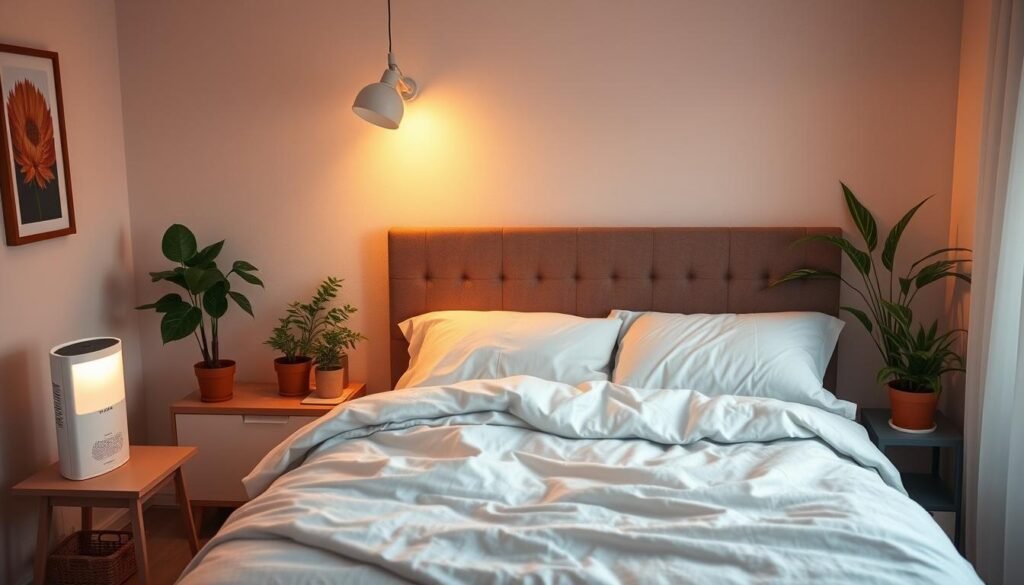Did you know over 60 million people in the U.S. wrestle with seasonal allergies each year? This large number shows how common allergies are. They really affect lives deeply. A big issue, allergy fatigue, often goes unnoticed. Yet it causes extreme tiredness, despite getting enough rest. Knowing how allergies and tiredness are linked is key. This is especially true for those feeling drained during allergy seasons.
We’re diving into the science of allergy fatigue. We’ll look at the usual allergens and share tips to fight off this tiredness. You’ll learn how to spot what causes your symptoms. Making changes to your lifestyle can help too. For more advice on beating allergy fatigue, check out this useful link.
Key Takeaways
- Seasonal allergies impact millions, often resulting in significant fatigue.
- Identifying specific allergens is essential for effective management.
- Natural remedies, including hydration and nutrition, can alleviate symptoms.
- Regular cleaning and proper sleep hygiene are crucial for reducing exposure.
- Consulting healthcare providers can enhance allergy management strategies.
Understanding Allergy Fatigue
Many people don’t see how allergies can make you tired. Allergy fatigue is when you feel very tired because of your body’s reaction to allergens. This type of tiredness is different because sleep doesn’t help. It can change how well you do daily tasks and affect your life.
What Is Allergy Fatigue?
Allergy fatigue is a deep tiredness from your body fighting allergens. When allergens are around, your body makes histamines and chemicals. This can cause a cycle of allergies and fatigue that gets worse over time.
People might have symptoms of allergies causing fatigue like nose congestion, which affects sleep, or just feel off. This can lead to mild or even severe tiredness that stops you from doing your daily stuff.
The Connection Between Allergies and Fatigue
The link between allergies and tiredness is mainly about how your body responds to allergens. Allergies cause long-term swelling in the body. This leads to many symptoms like nasal congestion and itchy eyes. These symptoms can make it hard to sleep well.
Because of bad sleep, people with allergies may find themselves feeling more tired during the day. It’s a cycle of allergy induced fatigue where poor sleep makes allergy symptoms worse.
| Allergy Symptoms | Effects on Energy Levels |
|---|---|
| Nasal Congestion | Disrupted sleep quality, leading to fatigue |
| Itchy Eyes | Increased discomfort, reducing overall alertness |
| Coughing | Interrupted nighttime rest, contributing to tiredness |
| Chronic Inflammation | Increased feelings of fatigue and mental fog |
It’s important to know how allergies lead to tiredness to take care of your health. By understanding how allergies affect your energy, you can find better ways to deal with them.
The Science Behind Allergy Fatigue
Understanding how allergy fatigue happens is key to getting why it’s so hard for some people. It’s mostly because of our body fighting allergies. This fight affects our sleep and how tired or energetic we feel.
How Histamines Affect Sleep
Histamines rise during allergic reactions, messing up our sleep cycle. They lower sleep quality, making us feel tired during the day. People with ongoing histamine issues face even more problems.
Nasal congestion is one such issue. It makes it hard to breathe at night, lowering the oxygen we get. This makes us feel more tired and shows why dealing with allergies is so important.
Inflammation and Energy Levels
Inflammation from our immune system’s reaction to things like pollen tires us out. It uses up our energy and can cause breathing problems. This makes us feel even more tired.
Studies show inflammation can even make thinking hard, leading to mental tiredness. This tiredness starts affecting our day-to-day life. It shows how common and tough allergy fatigue is for those dealing with it.
Common Allergens That Cause Fatigue
Learning about allergens that lead to fatigue can help people control their symptoms. Many suffer from seasonal allergies causing tiredness, especially during specific seasons. These allergens disrupt daily life and lower life quality.
Pollen and Seasonal Allergies
Pollen triggers seasonal allergies for many. High pollen counts make allergy symptoms worse, reducing energy. About 10-30% of adults and 40% of children have allergic rhinitis, leading to fatigue.
Nearly 70% of those with seasonal allergies face sleep problems during peak pollen times. This worsens fatigue. Allergens make the body release histamines, causing tiredness.
Indoor Allergens: Dust Mites and Pet Dander
Indoor allergens like dust mites and pet dander are major fatigue causes. About 8-10% of people are constantly tired from dust mites. Keeping homes clean and using HEPA filters can lower allergens. This helps fight allergy-induced fatigue.
Mold and Food Allergies
Mold allergies are common in damp places and can cause serious fatigue. Mold allergies could make you more likely to get chronic fatigue syndrome. This affects about 15% of those with the syndrome.
Food allergies, like reactions to dairy and gluten, can also cause tiredness. About 20% of people experience delayed fatigue from food allergies. Knowing how mold and food allergies affect tiredness is key. Avoiding triggers and getting diagnosed are important steps.
Combatting Allergy Fatigue
Many people with allergy fatigue find it hard to keep up with their daily tasks. Learning what triggers their allergies is key to handling them better. Knowing which allergens to avoid is very important in lessening their effect on you.
Identifying Your Triggers
Finding out what triggers your allergies is critical. Tests like skin prick and blood tests help find out which allergens tire you out. Common triggers include:
- Pollen from trees, grass, and weeds
- Indoor allergens like dust mites and pet dander
- Mold in wet places
Knowing your triggers lets you be more proactive. After finding them, you can take steps to reduce their impact. This helps boost your energy and makes life better.
Effective Strategies to Manage Symptoms
To manage allergy fatigue, mixing different methods helps. Here are some tips to fight off tiredness from allergies:
- Keep your house clean to lower allergens
- Use air purifiers for better air quality
- Cover your mattress and pillows to block dust mites
Making your living space allergy-free improves sleep quality a lot. Studies show that having fewer allergens at home is linked to sleeping better. Washing your beddings in hot water keeps dust mites away. Also, sleeping in the right position helps with congestion and makes your sleep more peaceful.

Allergies Fatigue: Symptoms to Watch For
Recognizing symptoms of allergy fatigue is key to managing it. People can show many signs that allergies are behind their tiredness. Symptoms range from always being tired to a drop in how well they think.
Persistent Tiredness and Mental Fog
Persistent tiredness is a common sign of allergy fatigue. This issue also brings a mental fog that lowers how much people get done each day. Kids in school might struggle to pay attention. This makes learning harder and can reduce how happy they feel.
Physical Symptoms of Allergy Fatigue
Physical signs of allergy fatigue include stuffy noses, headaches, and sore muscles. These symptoms make people feel very tired. It’s hard for them to do their daily tasks. Knowing these signs helps in finding the right treatment. This could bring relief from the heavy feeling that allergy fatigue causes.
| Symptom | Description |
|---|---|
| Persistent Tiredness | Chronic fatigue that interferes with daily activities. |
| Mental Fog | Difficulties in concentrating and mental clarity, often mistaken for other conditions. |
| Nasal Congestion | Blocked nasal passages leading to difficulty in breathing through the nose. |
| Headaches | Can range from mild discomfort to severe pain, often exacerbated by sinus pressure. |
| Muscle Aches | Soreness and discomfort in muscles, often associated with fatigue. |
Natural Remedies for Allergies Fatigue
Looking for relief from allergy fatigue? Try natural remedies. Things like diet, exercise, and lifestyle tweaks can make a big difference. These steps can help you manage symptoms and feel better overall.
Diet and Nutrition for Managing Allergies
A smart diet for allergy fatigue could cut down on inflammation. It might also boost your immune system. Try eating more anti-inflammatory foods, like:
- Fruits like oranges and berries
- Leafy greens like spinach and kale
- Omega-3-rich foods such as salmon and flaxseeds
Adding these foods to your meals could help you feel more energetic. Studies suggest that getting enough vitamin D—600 IU for adults under 70 and 800 IU for older folks—may ease allergy symptoms. Taking vitamin D with antihistamines might offer even more relief. Also, honey might help by lowering inflammation. This makes it a good pick for a diet for allergy fatigue.
Looking for more natural remedy tips? Check this source.
Exercise and Lifestyle Changes for Relief
Adding some exercise for managing fatigue can really pep you up. It can also cut down on allergy symptoms. Try to get at least 150 minutes of moderate exercise or 75 minutes of something tougher each week. Exercising in cold weather might help you breathe easier and lower allergy symptoms for up to two months.
Mixing exercise with lifestyle changes for allergy fatigue can bring good results. Lowering stress through yoga or meditation not only makes you healthier. It also clears your mind. These changes can shield you from the tiredness and sluggishness allergies often cause.

| Natural Remedies | Potential Benefits | Recommended Practices |
|---|---|---|
| Vitamin D | Reduced allergy symptoms | 600-800 IU daily |
| Honey | Reduces inflammation | Include in daily diet |
| Regular exercise | Improved energy levels | 150 minutes moderate weekly |
| Yoga/Meditation | Stress reduction | Incorporate into daily routine |
Over-the-Counter and Prescription Medications
Managing allergy symptoms can involve over-the-counter and prescription meds. Those looking for relief can choose from antihistamines, nasal sprays, and eye drops. These help address specific symptoms effectively.
Antihistamines: Which to Choose?
Antihistamines help fight the effects of histamines released during allergic reactions. Popular options like cetirizine (Zyrtec Allergy) and loratadine (Claritin) offer efficient relief. However, some people might feel sleepy even though these meds are supposed to be less sedating. They are helpful for daily use during allergy seasons. They help reduce symptoms without making you too tired. It’s best to talk to a healthcare provider to choose the right antihistamine and understand side effects.
The Role of Nasal Sprays and Eye Drops
Nasal sprays and eye drops can really improve comfort for those with allergies. Corticosteroid nasal sprays are great for managing hay fever. They work best if used properly once or twice daily. They help with nasal congestion and irritation. Saline nasal sprays offer extra moisture and clear out allergens. Eye drops with antihistamines or mast cell stabilizers fight itching and redness from allergies. For more info on allergy meds, check out this resource.
An Effective Sleep Hygiene Routine
Good sleep hygiene is key to lessening allergy fatigue. A structured routine improves sleep for those with allergies. Keeping your sleeping area free of allergens is important. Also, sticking to a regular sleep time helps your body’s clock, giving you better rest.
Ensuring Allergen-Free Environments
For an allergen-free bedroom, you can take several steps. These include:
- Using hypoallergenic bedding materials.
- Cleaning often to remove dust and pet hair.
- Keeping windows closed when pollen is high outside.
- Using HEPA air purifiers to cut down nearly all airborne allergens.
These actions can make a big difference in your sleep. They help control allergy symptoms, so you wake up feeling more energetic.
Establishing a Consistent Sleep Schedule
A regular sleep routine supports your body’s natural sleep-wake cycle. This can help ease sleep issues from allergies. Aim for 7 to 9 hours of sleep every night. To help, you can:
- Go to bed and wake up at the same times every day, even weekends.
- Turn off electronics like phones and TVs before bedtime.
- Try relaxing activities such as meditation or reading before sleep.
These habits can significantly improve your sleep if you have allergy fatigue. With the right sleep hygiene and a clean bedroom, you’ll likely wake up feeling refreshed and ready for the day.

| Strategy | Impact on Allergy Fatigue |
|---|---|
| Using Hypoallergenic Bedding | Reduces exposure to dust mites |
| Regular Cleaning | Decreases allergens on surfaces |
| HEPA Air Purifiers | Significantly lowers airborne allergens |
| Consistent Sleep Schedule | Improves overall sleep quality |
Consulting Healthcare Providers
If you have allergies causing ongoing symptoms, getting help from healthcare providers is crucial. They carry out allergy testing to pinpoint the allergens making you tired. This results in a custom treatment plan just for you. Without their advice, your quality of life might suffer because of untreated symptoms.
The Importance of Allergy Testing
Allergy tests help you know what triggers your allergic reactions. This knowledge is key to managing your allergies effectively. Many people with allergic rhinitis feel tired all the time. Knowing what you’re allergic to lets doctors suggest changes to beat your fatigue. This can make your daily life better.
When to Seek Expert Advice
Don’t wait to see healthcare professionals if your allergy symptoms don’t improve with basic treatments. New or worsening symptoms can make figuring out the right treatment harder. An expert’s advice can rule out other health issues tied to your fatigue. So, if you’re tired because of allergies, getting medical advice is a good move. This helps you find the best way to feel more energized.
| Symptoms | When to Consult Healthcare Providers |
|---|---|
| Persistent fatigue | Seek advice if symptoms last more than a week |
| Increased severity of symptoms | Contact providers if over-the-counter medications fail |
| New allergy symptoms | Consult if experiencing unfamiliar symptoms |
| Difficulty sleeping due to symptoms | Discuss sleep quality and fatigue with providers |
Managing Allergies Related Fatigue
Handling allergy-induced fatigue takes multiple steps, including making a strong support network and using ongoing strategies. Building a support system for allergy fatigue means connecting with loved ones and healthcare experts. These connections offer emotional and practical help. It helps to share with those who get what it’s like to deal with allergy-related chronic fatigue.
Building a Support System
Growing a support network helps in tackling symptoms better. Here’s how:
- Join groups or online forums that focus on allergy management.
- Involve friends and family in talks about allergies and tiredness.
- Ask healthcare providers for advice on handling fatigue.
- Use resources from allergy groups for education and tips.
Long-Term Strategies for Relief
To handle chronic fatigue from allergies, a proactive stance is key. Getting regular checks helps identify and avoid allergens. Some useful tactics include:
- Sticking to treatment plans, like medicines or immunotherapy.
- Keeping the environment allergen-free by cleaning and closing windows when pollen is high.
- Adopting a healthy lifestyle with balanced eating and exercise for more energy.
- Improving sleep by managing allergies better, which helps sleep quality.
By emphasizing these strategies consistently, one can significantly improve their energy and health. This step leads to a fuller life without allergy fatigue holding them back.
Conclusion
Dealing with allergy-related tiredness needs a full plan. Pinpointing triggers lets people manage symptoms and boost their life quality. It’s key to know that many with allergies also struggle with sleep. This makes tackling allergy and fatigue links crucial for better energy and work output.
There are easy ways to ease allergy tiredness. Stay away from allergens and keep a regular sleep schedule. Clean regularly to fight off indoor allergens. These steps can greatly lower tiredness. Nearly one-fourth of pet allergy sufferers find their sleep gets worse. This shows managing allergens is key for good rest.
Understanding allergies and their effects is the first move toward feeling better. Seeking doctor advice or natural solutions can help. Those who tackle their allergy symptoms often find their energy back. So, using these tips can make life more enjoyable.